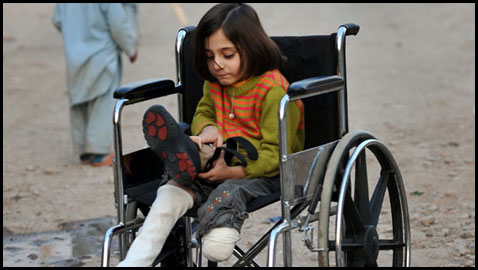
Inclusive
education advocates for educational systems with an approach that
serves the needs of all learners while identifying and overcoming
barriers that prevent children with disabilities from being included in
the educational system. Azad Jammu & Kashmir has a high literacy
rate of 66% compared with Pakistan 56%. Inspite of this commendable
figure, about 28.9% of children with disabilities (CWDs) between the
ages of 5 and 20 do not attend primary and high school. These figures
are significantly higher when compared to children without disabilities
in the same age groups.
The
Constitution of Pakistan recognizes education as a directive principle
of state policy under article 25-A of the Constitution and justifiable
right. However, the National Education Policy of 2009 expressly affirms
the rights of children with disabilities & without disabilities to
education. In addition, Section 9 of the Constitution Article 25-A
imposes an obligation on duty bearers to ensure that children with
disabilities are included in the educational system.
The
right to education is also protected under Article 24 of the United
Nations Convention on the Rights of Persons with Disabilities (CRPD).
This provision also places an obligation on state parties not to exclude
children with disabilities from free and compulsory primary education,
and that the inclusion is complemented by accessibility, reasonable
accommodation, and effective individualized support aimed at maximizing
academic and social development. Pakistan ratified the CRPD in 2008 and
adopted a free universal primary education in 2001 as a means of
achieving education for all. Pakistan has a National Disability Policy
of 2002, the Education Sector Strategic Plan 2013-2016, and the Special
Education Unit under department of social welfare all geared towards
achieving inclusive education for children with disabilities.
The
legal implication of these laws and policies is that the government of
Pakistan has obligations under international and domestic law to ensure
that children with disabilities are not excluded from the general
educational system and that children with disabilities can learn on an
equal basis with abled children. However, children with disabilities
still do not attend primary school. There is a huge gap between the
legal framework and the practical implementation of inclusive education
in Pakistan & Azad Jammu & Kashmir.
Several
factors account for Azad Jammu & Kashmir’s poor realization of
inclusive education. Inadequate human and material resources such as
trained teachers, facilities are not inclusive are a major challenge.
More importantly, children with disabilities are still perceived as
abnormal and should not be placed together with children without
disabilities.
An
inclusive system is reflective of a system that provides a range of
support that meets the needs of all children. Pakistan’s and AJK’s
self-proclaimed practice of inclusive education is based on placing
children in the mainstream classroom with inadequate facilities. These
few facilities are usually made available at the insistence of disabled
people’s organizations, and sometimes by the government. This approach
reflects an integrated system requiring children with disabilities to
fit in rather than an inclusive system designed to meet the needs of all
children including children with disabilities.
There
is a lack of commitment by the government in creating the necessary
inclusive environment through facilities, support and capacity building
programmes to fill the gaps in the educational sector. As long as
children with disabilities do not have access to quality basic education
in an all-inclusive system and on an equal basis with others, Pakistan
and AJK falls short of its obligations under Article 24 of the CRPD.
In
conforming to the standards of the Convention, capacity building is its
key. This requires the government of Pakistan and AJK to support
regular and effective capacity building initiatives such as workshops
and disability equality training for all teachers in the educational
system. Allocation of sufficient resources to facilitate an
all-inclusive educational system and develop the capacity of all schools
in providing education for all children is also necessary. This needs
to be complemented by renovating public utilities to accord
accessibility to schools and other public places.
The
legal framework in Pakistan is conducive for inclusive education;
however this has not been translated into measureable targets aimed at
providing education for all categories of children. Pakistan and AJK is
yet to realize that the full implication of inclusive education involves
developing all schools to meet the needs of all children with
disabilities and not limiting educational opportunities for children
with disabilities to specific schools as the current situation does.
Education cannot be free if the system lacks proper mechanism to make it
available for the benefit of all children.
No hay comentarios:
Publicar un comentario